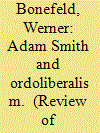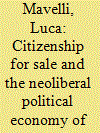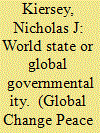|
|
|
Sort Order |
|
|
|
Items / Page
|
|
|
|
|
|
|
| Srl | Item |
| 1 |
ID:
120463


|
|
|
|
|
| Publication |
2013.
|
| Summary/Abstract |
In the context of the contemporary crisis of neoliberal political economy, the politics of austerity has reasserted the liberal utility of the state as the political authority of market freedom. This article argues that economy has no independent existence, and that instead, economy is a political practice. It examines the political economy of Adam Smith and the German ordoliberal tradition to decipher the character of the political in political economy and its transformation from Smith's liberal theory into neoliberal theology. Ordoliberalism emerged in the late 1920s at a time of a manifest crisis of political economy, and its argument was fundamental for the development of the neoliberal conception that free economy is matter of strong state authority. The conclusion argues with Marx that the state is the concentrated force of free economy.
|
|
|
|
|
|
|
|
|
|
|
|
|
|
|
|
| 2 |
ID:
161423


|
|
|
|
|
| Summary/Abstract |
Recent research views the proliferation of citizenship-by-investment schemes primarily as a manifestation of the commodification of citizenship by states succumbing to the logic of the market. I argue that these schemes exceed mere processes of commodification. They are part of a neoliberal political economy of belonging. This political economy prompts states to include and exclude migrants according to their endowment of human, financial, economic, and emotional capital. I show how the growing opportunities for wealthy and talented migrants to move across borders, the opening of humanitarian corridors for particularly vulnerable refugees, and the hardening of borders for “ordinary” refugees and undocumented migrants all stem from the same neoliberal rationality of government. In doing so, I challenge mainstream understandings of neoliberalism as a process of commodification characterized by the “retreat of the state” and “domination of the market.” I approach neoliberalism as a process of economization, which disseminates the model of the market to all spheres of human activity, even where money is not at stake. Neoliberal economization turns states and individuals into entrepreneurial actors that attempt to maximize their value, not just in economic and financial but also in moral and emotional terms. This process, I conclude, undermines political notions of citizenship grounded in reciprocity, equality, and solidarity, not by replacing these principles with economic ones but by rewriting these principles in economic terms.
|
|
|
|
|
|
|
|
|
|
|
|
|
|
|
|
| 3 |
ID:
085720


|
|
|
|
|
| Publication |
2008.
|
| Summary/Abstract |
Abstract This article addresses recent theoretical discussion about the state under conditions of globalisation, focusing in particular on recently popular 'world state' theory, as articulated by Martin Shaw and Alexander Wendt. It suggests that while world state theory is useful to the extent that it historicises the function of the state, it can be challenged for its uncritical approach to the question of how state power is actually constituted. To make this argument, the article refers first to an emerging Marxist critique that focuses on liberal hypocrisy and the role of imperial violence in the formation of the world state. However, while this approach reveals the elision of many forms of violence in world state theory, it shares world state theory's tendency to avoid exploring the role of more constitutive forms of power. Challenging this view, the article turns to Foucault's theory of governmentality and some recent applications of it to Imperialism, Empire, and the War on Terror.
|
|
|
|
|
|
|
|
|
|
|
|
|
|
|
|
|
|
|
|
|